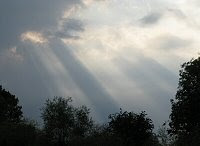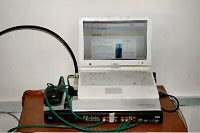Tonight it was Rachael's turn to bring something to the table, and the evening turned into a discussion about family, both worldly and spiritual, loss, grief, hope, and the Lord's healing.
We thought about Madeleine
McCann again, and prayed for her and her family in their continuing search for their beautiful daughter.

Jody prayed that Father pour our His holy spirit upon Madeleine and her family, that they may continue to receive the blessing of hope, and she received a word that although we do not know the future, nevertheless He does, and that He continues to be very close to Madeleine at all times and holds her in His heart. We were reminded that all things work to His purpose, however impossible that may seem to us at the time. We prayed for Kate and Gerry
McCann, that they might be gently guided to a place of acceptance, and for them and ourselves, that we might recognise Him as He really is, in the ordinary,
everyday things in life.
We read aloud and discussed a prayer for Madeleine, single lines taken from different parts of the bible, strung together like a beautiful necklace with a distinct meaning for her, a love letter from her Father in heaven. This included the lines 'my dear child, I knew you even before you were born' (Jeremiah 1:4-5), 'my plan for you future has always been filled with hope' (Jeremiah 29: 11), and 'when you are broken hearted I am close to you' (Psalm 34: 18).
Peter prayed that we can be beacons of light, and that we might be strengthened to carry His word beyond ourselves. This led Jody to pray that we be enabled to leave everything worldly behind, and do the things that He speaks of, and be in the places He want us to be. We thanked Him for reminding us that He always loves us.
Rachael shared a picture. She was walking slowly down a beautiful winding flight of stairs. At the bottom were some French doors, fully opened, and a gentle breeze moving the voile curtain at each side. She walked out into a beautiful garden, where everything was perfect, with wonderful flowers of fabulous colours and scents, melodic birdsong, a peaceful and tranquil place that gave her rest and healing. This is His garden, where we can visit at any time, just by thinking of Him. He will transport us to a place of calm filled with His love when we call upon Him for help.
Jody also saw a picture, of an angel fish swimming in really dark water. There was a chemical
phosphorescence in it's scales, which meant that even when a very tiny ray of light hit it, it shone and lit up. Jody described a feather like fin on the fish, green, blue and red,
iridescent, which glowed in the darkness. God is saying that He is the fin that propels us forward, even when it is dark He knows the way, even when the water is really black, He is still very colourful and is able to move us around in the world for His purpose.
Rachael read some short extracts from David
Beckham's autobiography. David is not a Christian, as far as we know, but nevertheless some of the things he has written about in his book about family, lit up with a meaning beyond his own. For example, where he says that until he loved his own children, he never really realised how much his mum and dad loved him. As parents ourselves, with the birth of a new baby, we have all experienced anew the realisation that this special joy must be a reflection of how much our heavenly Father loves us. In knowing how deeply we feel for our own child, we get some inkling of His attachment to us.
David describes the birth of his second son, when he had expected, having experienced it once before, to be ready for the emotions it brought. But then says 'that's not how it was for me at all. ...the feelings of excitement and happiness, of pride and awe, just flooded through me with all the same intensity they had three years before.....it took my breath away....I could feel my heart grow to make room for the new life'. It seemed amazing to us that our Father in heaven feels something like this when one of us is reborn. That each one of us is special to Him, that He has enough room in His heart for all of us to thrive and grow in the spirit.




















